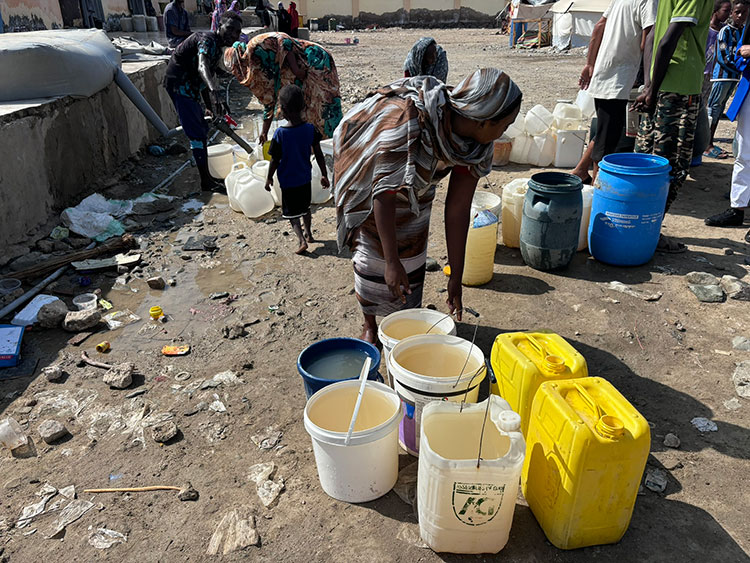
15 April 2025, Cairo, Egypt – Two years into the conflict, Sudan’s health system is at breaking point. As the rainy season looms the country faces a perfect storm of disease outbreaks, malnutrition and collapsing services at a time when humanitarian access is dangerously restricted and funding for health is running dry.
Today, more than 30 million people in Sudan need humanitarian assistance, including over 20 million in urgent need of health services. But insecurity, shortage of life-saving medicines and medical supplies and repeated attacks on health facilities and personnel have made access to care and aid nearly impossible for millions. Hospitals have shut their doors or are only partially functioning. People are dying from diseases, malnutrition, conflict-related injuries and the daily lack of essential medicines, vaccines and lifesaving services.
“This crisis is tearing Sudan’s health system apart,” said WHO Regional Director for the Eastern Mediterranean Dr Hanan Balkhy. “Hospitals have run out of supplies; health workers are under threat and disease is spreading in areas we can barely reach. The rainy season will multiply the health risks while further restricting access to those in need. We need urgent access and funding to provide essential care to millions of vulnerable people.”
The consequences are already visible. More than two-thirds of Sudan’s states are battling 3 or more disease outbreaks at once, including cholera, dengue, measles and malaria, fuelled by the breakdown of surveillance, vaccinations, clean water systems and vector control. With immunization campaigns disrupted, children are dying from preventable diseases.
Malnutrition is surging, particularly among young children and mothers. Famine has been confirmed in at least 5 areas, and projections indicate expansion in 17 areas with 24.6 million people – half the population – expected to face high levels of acute food insecurity in 2025, including 770 000 children under 5 estimated to suffer from severe acute malnutrition.
Since April 2023, WHO has verified 156 attacks on health care, which have killed 318 people and injured 273. These attacks are blatant violations of international humanitarian law and continue to erode any remaining capacity to deliver care.
Despite these unprecedented constraints, WHO and its partners are doing everything possible to deliver. Since the conflict began, WHO-supported health services have reached over 1 million patients and helped sustain 52 hospitals across Sudan’s 18 states. More than 10 million children have been vaccinated against measles and rubella, 11.5 million against polio and nearly 12.8 million people against cholera.
Stabilization centres supported by WHO have treated close to 50 000 children suffering from severe acute malnutrition with medical complications. In November 2024, with WHO support, Sudan launched the malaria vaccine for the first time, targeting 148 000 children in Gedaref and Blue Nile states over 1-year period, more than 35 000 of whom have been vaccinated in the 4 months since November.
WHO has also expanded support for the clinical management and other lifesaving interventions and mental health and psychosocial support to survivors of gender-based and sexual violence, particularly among displaced populations.
WHO has also delivered over 2,250 metric tons of medical supplies to Sudan’s 18 states since the start of the conflict in April 2023, including via cross-border operations from Chad and South Sudan.
Additionally, WHO’s work with the Ministry of Health in Sudan goes beyond humanitarian support towards development. Recently, the Sudan Health Assistance and Response in Emergencies (SHARE) project was launched, marking a strategic partnership between WHO, the World Bank, the Sudan Ministry of Health, and UNICEF. The project aims to support the emergency, and development needs to restore the functionality of hospitals and primary health centres to provide essential health and nutrition services and support health systems functions.
But the scale of need is still far outpacing the response.
In 2025, WHO has a US$ 135 million-worth response plan, one-fifth of which is funded, only a fraction of what is urgently needed.
“Sudan’s brave health workers are achieving the impossible with almost nothing,” said Dr Balkhy. “They need protection, safe access and the tools to save lives. Time is running out.”
WHO urgently calls on all parties to the conflict in Sudan to ensure unimpeded, sustained humanitarian access and to respect international humanitarian law. Health care is a human right, but in Sudan today it is a lifeline at risk of being severed.
Related links:
WHO EMRO | Crisis | Sudan
For more information:
Loza Mesfin Tesfaye, WHO Communication Officer in Sudan,
This e-mail address is being protected from spambots. You need JavaScript enabled to view it









